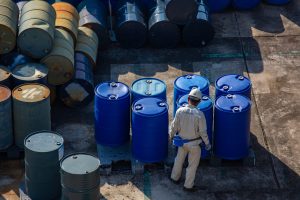On June 4, 2025, the EPA announced a penalty settlement in the amount of $270,437 with Ultramar Inc., doing business as Valero Wilmington Refinery, over chemical safety violations under both the Clean Air Act (CAA) and the Emergency Planning and Community Right-to-Know Act (EPCRA).
The facility uses hydrofluoric acid, a dangerous chemical that can cause severe, permanent health problems, to refine petroleum. It’s regulated by the CAA’s Risk Management Program (RMP) governing processes that produce, process, or store more than 1,000 pounds (lb) of hydrofluoric acid.
“A June 2022 EPA inspection of the Wilmington facility identified violations of the CAA’s [RMP] requirements,” according to an EPA news release. “The inspection found several safety problems, including that the facility had underestimated the distance that dangerous concentrations of chemicals could spread in a worst-case scenario release. Underestimating the impact of such a release potentially leaves nearby homes, daycares, schools and businesses unprepared in an emergency. Accurate calculations are essential for emergency responders to quickly protect the public from chemical releases.”
Other violations identified in the inspection include:
- Inaccuracies in the facility’s equipment diagrams essential for rapid emergency response,
- Insufficient analysis of how facility-wide power failures might compromise safety systems,
- Failure to implement previously recommended safety measures, and
- Omission of mandatory information in both operating procedures and incident reports.
The EPA also determined that Valero violated EPCRA by failing to immediately notify state emergency officials after three separate sulfur dioxide releases in 2018, 2020, and 2021. Releases of sulfur dioxide require immediate reporting when they exceed 500 lb.
“I had hoped that Valero would invest in upgrades to their California facilities and stay in business in our state. They will soon shut down at least one California refinery and leave. This will be a huge hit to gas prices in California, Nevada and Arizona,” EPA Pacific Southwest Regional Administrator Josh F.W. Cook says in the Agency’s release. “This settlement … ensures that Valero has improved its safety systems and emergency response procedures at the Wilmington refinery. As they continue toward closure elsewhere in the state, we at EPA will continue to monitor the situation.”
RMP rule
The RMP rule requires facilities holding more than a threshold quantity of a regulated substance to develop an RMP that:
- Identifies the potential effects of a chemical accident
- Identifies steps the facility is taking to prevent an accident
- Spells out emergency response procedures should an accident occur
See the EPA RMP Rule Overview webpage for additional information.
EPCRA
Title III of the Superfund Amendments and Reauthorization Act (SARA Title III) was passed in 1986 in response to concerns regarding the environmental and safety hazards posed by the storage and handling of toxic chemicals. This Act authorized EPCRA, which imposed reporting requirements for federal, state, and local governments, tribes, and industry.
These requirements covered emergency planning and “community right-to-know” reporting on hazardous and toxic chemicals. The community right-to-know provisions help increase the public’s knowledge and access to information on chemicals at individual facilities, their uses, and releases into the environment. States and communities, working with facilities, can use the information to improve chemical safety and protect public health and the environment.
See the EPA EPCRA webpage for additional information.

